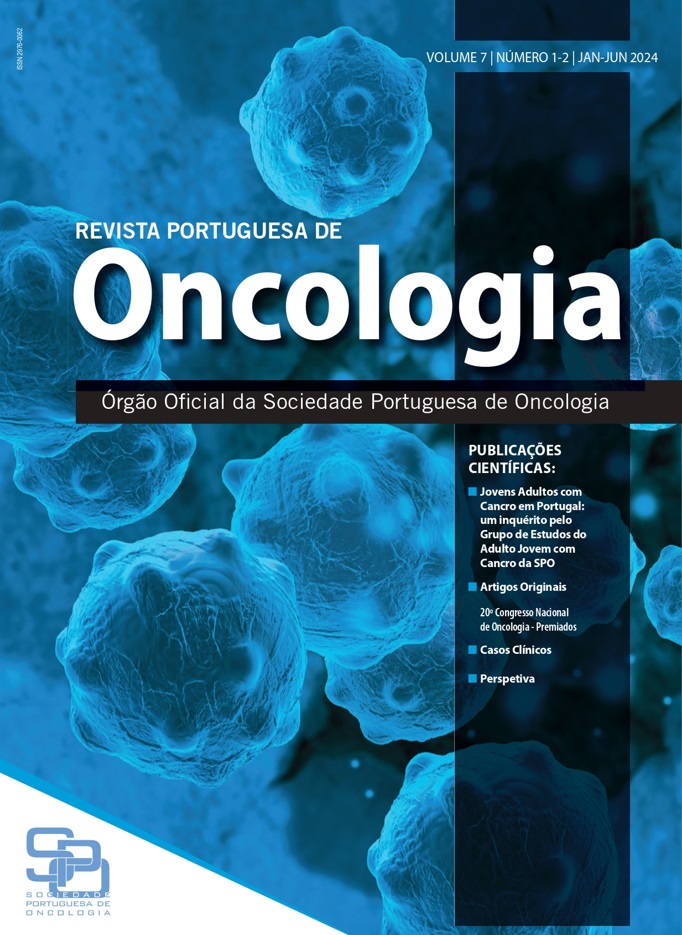Cancer searching after unprovoked Thromboembolism – still a clinical controversy
Abstract
Unprovoked Venous thromboembolism (VTE) may be the first sign of an occult cancer. To identify VTE patients at increased risk of cancer and that would have grater benefit from an extensive screening, the RIETE prediction score was developed.
We designed an unicentric prospective trial at Senhora da Oliveira Hospital to evaluate the RIETE score performance in identifying the patients at a high-risk of a cancer diagnosis after a VTE and validate its clinical use.
We included 34 patients between November 2020 and April 2022. After a median follow-up of 21 months no cancer diagnosis was found.
These results aren’t the expected and do not allow us to clearly state on the RIETE score power to distinguish high from low-risk patients of having a cancer diagnosis after VTE. This is mainly because the recruitment goals weren’t reached, which we attribute to the COVID-19 pandemic period, that altered the clinical practice.
We still think these is a relevant work that tries to solve an important clinical question, that could impact physicians and patients that deal with VTE, and so we hope to achieve a greater population number so that we can get meaningful results and establish the RIETE score ability to identify a group of patients at higher risk of cancer diagnosis after an unprovoked VTE.
Downloads
References
R. Ihaddadene, D.J. Corsi, A. Lazo-Langner, et al., Risk factors predictive of occult cancer detection in patients with unprovoked venous thromboembolism, Blood 127 (16) (2016) 2035–2037, https://doi.org/10.1182/blood-2015-11-682963
N. van Es, C. Ay, L. Jara-Palomares, Screening for occult cancer in patients with venous thromboembolism: past, present, and future, Hamostaseologie 40 (3) (2020) 270–279, https://doi.org/10.1055/a-1150-2286
A. Piccioli, A.W.A. Lensing, M.H. Prins, et al., Extensive screening for occult malignant disease in idiopathic venous thromboembolism: a prospective randomized clinical trial, J. Thromb. Haemost. 2 (6) (2004) 884–889, https://doi.org/10.1111/j.1538-7836.2004.00720.x
M. Carrier, A. Lazo-Langner, S. Shivakumar, et al., Screening for occult cancer in unprovoked venous thromboembolism, N. Engl. J. Med. 373 (8) (2015) 697–704, https://doi.org/10.1056/NEJMoa1506623
P. Robin, P.Y. Le Roux, B. Planquette, et al., Limited screening with versus without 18F-fluorodeoxyglucose PET/CT for occult malignancy in unprovoked venous thromboembolism: an open-label randomised controlled trial, The Lancet Oncology 17 (2) (2016) 193–199, https://doi.org/10.1016/S1470-2045(15) 00480-5
L. Jara-Palomares, R. Otero, D. Jimenez, et al., Development of a risk prediction score for occult cancer in patients with VTE, Chest 151 (3) (2017) 564–571, https://doi.org/10.1016/j.chest.2016.10.025
L. Jara-Palomares, R. Otero, D. Jimenez, et al., Validation of a prognostic score for hidden cancer in unprovoked venous thromboembolism, PLoS One 13 (3) (2018) 1–11, https://doi.org/10.1371/journal.pone.0194673
L. Bertoletti, P. Robin, L. Jara-Palomares, et al., Predicting the risk of cancer after unprovoked venous thromboembolism: external validation of the RIETE score, J. Thromb. Haemost. 15 (11) (2017) 2184–2187, https://doi.org/10.1111/ jth.13842
A. Rosell, S. Lundstrom, N. Mackman, et al., A clinical practice-based evaluation of the RIETE score in predicting occult cancer in patients with venous thromboembolism, J. Thromb. Thrombolysis 48 (1) (2019) 111–118, https://doi.org/ 10.1007/s11239-019-01822-z
J.C. Mendonça, J. Martins, C. Fernandes, et al., Cancer risk after a venous thrombotic event - RIETE score, Thrombosis Research 202 (2021) 43–44, https://doi.org/10.1016/j.thromres.2021.02.036










